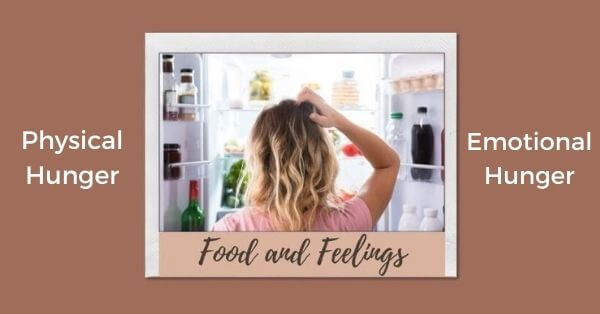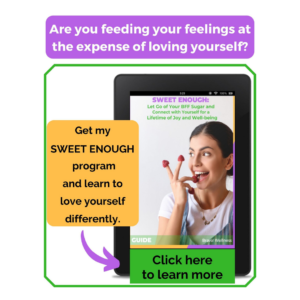[This post is Part 2 of a series. If you missed Part 1, you can read it here.]
Food and Feelings
Emotional eating occurs when you use food to manage your feelings, rather than to satisfy your hunger. This can trigger guilt and create a cycle where you eat because you feel bad and feel bad because you eat.
When you reach for something to eat, it’s important to know the real reason why you’re standing in front of the refrigerator or pantry, about to pick up some fast food, or buy some candy. Are you physically hungry, or are you using food to avoid anxiety, loneliness, sadness, boredom, or some other feeling?
Let’s look at the difference between emotional hunger and real, physical hunger. Physical hunger takes time to develop because it stems from the fact that your body truly needs nourishment at various times during the day (think: three meals a day for most people). Emotional hunger ignores this process and instead will make you crave foods even after eating a full meal. These cravings often lead you to some sort of comfort food.
Physical Hunger
The thing about hunger is that it rarely subsides until you have eaten something. Real hunger is a sign that your body needs nutrients to rejuvenate your blood, oxygen, muscles, bones, and all the cells in your body. When you feel that growling in your stomach, there’s no doubt that it is time to eat. When you have a healthy relationship with food, you will eat until you are satisfied, but not until you are so full that you feel sick, out of control, or out of balance.
Emotional Hunger
There are certain patterns and indications that you are becoming emotionally dependent on food, most likely sugar and carbs such as potato chips, pretzels, cookies, and donuts.
- Do you find yourself procrastinating when working on a big project by eating?
- Do you eat more when you are stressed or overwhelmed?
- Do you feel out of control around food?
- Do you reach for a snack when you are mad or sad?
- Do you eat mindlessly when you are bored or lonely?
- Do you eat when you are full?
- Do you reach for food to reward yourself?
If you answered yes to any of the above questions, you may be in a cycle of emotional eating. In fact, this is often referred to as a vicious cycle because you cannot stop. The most telling sign of emotional eating is the deep feeling of shame that you feel after overeating. Mealtime, even those times when you are having a healthy snack, should be an enjoyable activity; a time when you feel you are nourishing your body and mind. If you feel guilty about eating, it means there is an unsettling reason attached to your choices.
What Can You Do?
Take a deep breath. If you are realizing that you are an emotional eater, I can assure you that you are not alone. Don’t tell yourself that you are bad or that something is wrong with you and you need “fixing.”
You are a human being with feelings, and sometimes those feelings are overwhelming. There are many strategies and tools that can help you with that. You can find them everywhere you look, but you don’t need to try to figure it out alone. I am here to support you.
One thing that I offer that you can access immediately is my free program, Sweet Enough: Let Go of Your BFF Sugar and Connect with Yourself for a Lifetime of Joy and Well-being. I’d love to have you download it and give it a try. More importantly, I’d love to hear your experience with it. Drop a comment below and let me know—is it helpful?
Stay tuned for part three of this series!



